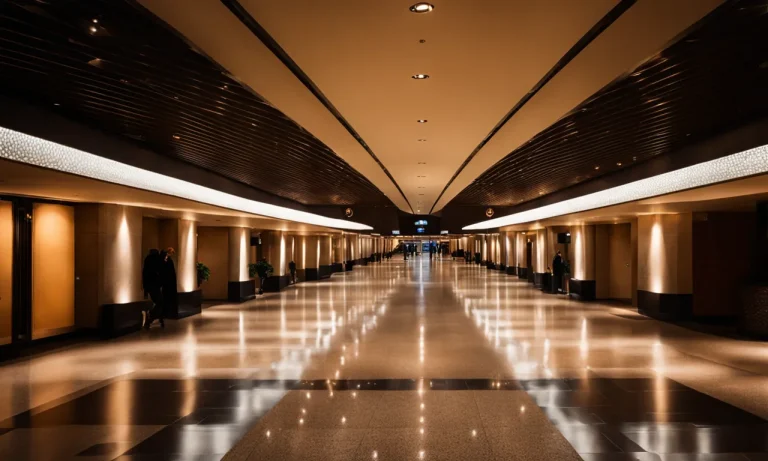The hotel industry, a cornerstone of the hospitality sector, thrives on the meticulous efforts of many, and hotel housekeepers play a crucial role in this ecosystem.
Responsible for maintaining cleanliness, ensuring guest comfort, and often going the extra mile to enrich the guest experience, hotel housekeepers contribute significantly to a hotel’s reputation and success.
Despite their integral role, discussions about their remuneration often remain in the shadows.
If you’re short on time, here’s a quick answer to your question: the average hourly wage for hotel housekeepers in the United States ranged from $10 to $15. Keep in mind that wage rates can differ in different countries and regions, so it’s advisable to check the current rates in your specific area.
This analysis aims to shed light on the earnings of hotel housekeepers, taking into account the average pay rates, influencing factors, additional income sources, and comparison with other hospitality roles, thereby providing a holistic understanding of their financial compensation.
General salary range for hotel housekeepers
Hotel housekeepers are responsible for ensuring that guest rooms and public areas are clean and well-maintained. They perform a variety of tasks, including changing linens, dusting, vacuuming, and cleaning bathrooms. If you are considering a career as a hotel housekeeper, one of the first questions you may have is how much you can expect to earn.
Average pay rates in the United States
The average hourly wage for a hotel housekeeper in the United States is $11.46, according to Payscale.com. However, the actual pay rate can vary widely depending on factors such as location, experience, and the size and type of hotel. In some cases, housekeepers may also receive tips from guests, which can increase their overall earnings.
In addition to an hourly wage, many hotel housekeepers receive benefits such as health insurance, paid time off, and retirement savings plans. These benefits can vary depending on the employer and the housekeeper’s employment status (full-time, part-time, or seasonal).
Global pay rates comparison
While pay rates for hotel housekeepers can vary widely from one country to another, there are some general trends that can be observed. According to ziprecruiter.co , the average monthly salary for a hotel housekeeper in the United States is $2,250, while in the United Kingdom is $1,900. In India, the average monthly salary for a hotel housekeeper is 13,874 INR (approximately $170 USD).
It’s important to keep in mind that these figures are averages and can vary widely depending on the specific employer, location, and other factors. However, they can serve as a useful starting point for understanding the general pay rates for hotel housekeepers in different parts of the world.
Factors influencing hotel housekeepers’ wages
Hotel housekeeping is an essential task that ensures the comfort and satisfaction of hotel guests. The work of hotel housekeepers is not easy, and they should be adequately compensated for their efforts. However, the wages of hotel housekeepers vary depending on several factors. Here are some factors that influence how much hotel housekeepers make:
Impact of location
The location of the hotel plays a significant role in determining the wages of hotel housekeepers. In cities with a high cost of living, hotel housekeepers generally earn more than in rural areas. This is because hotels in such areas usually charge higher rates, which enables them to pay their employees more. For instance, a hotel housekeeper in New York City may earn an average hourly wage of $16.57, while a housekeeper in a small town in Kansas may earn only $10.94 per hour.
Influence of hotel size and prestige
The size and prestige of the hotel is another factor that affects how much hotel housekeepers make. Large hotels that cater to high-end customers usually pay their employees more than small hotels that cater to budget-conscious travelers. This is because large hotels have more rooms to clean and more demanding guests who require personalized attention. Moreover, hotels with a prestigious reputation usually pay their employees more to maintain the high standard of service they offer their guests.
Role of experience and seniority
The experience and seniority of hotel housekeepers also play a crucial role in determining their wages. Senior housekeepers who have worked in the hotel industry for several years have more experience and skills, which enable them to command higher wages. Moreover, experienced housekeepers are more efficient and can clean more rooms per hour, which makes them more valuable to the hotel. As such, hotels usually offer higher wages to experienced and senior housekeepers.
IAmA former housekeeper at a 4-star hotel. AMA
by u/cadmiumgrey in IAmA
Additional income opportunities for hotel housekeepers
Hotel housekeeping is a demanding job that requires hard work and attention to detail. While it may not be the highest-paying job, there are additional income opportunities available to hotel housekeepers beyond their regular salaries. In this article, we will explore some of the ways that hotel housekeepers can earn extra income.
Tipping practices
In the hospitality industry, tipping is a common practice. It is not uncommon for hotel guests to tip their housekeeper for their hard work and dedication. According to a survey conducted by TripAdvisor, 34% of travelers leave a tip for the housekeeping staff.
While tipping is not mandatory, it can be a significant source of additional income for hotel housekeepers. The amount of the tip varies depending on the hotel and the individual guest. Some guests may leave a few dollars, while others may leave a more substantial amount.
It is important to note that not all hotels allow tipping, and some have strict policies against it. However, many hotels do allow it, and housekeepers can benefit from this additional income. It is always best to check with the hotel’s policy before accepting tips from guests.
Other income sources
Aside from tips, hotel housekeepers can also earn additional income from other sources. Some hotels offer bonuses or incentives for employees who meet certain performance goals or work a certain number of hours. Housekeepers can also take on additional responsibilities such as laundry services, which can earn them extra money.
Another option for hotel housekeepers is to work as a freelancer or independent contractor. Many hotels hire outside contractors for deep-cleaning services, which can be an excellent opportunity for housekeepers to earn extra money. Websites such as Upwork and Freelancer can connect housekeepers with clients looking for cleaning services.
Moreover, some housekeepers become entrepreneurs and start their cleaning businesses. They can offer cleaning services to local residents or businesses and earn extra income outside of their regular hotel job.
While hotel housekeeping may not be the highest-paying job, there are additional income opportunities available for those who are willing to work hard and explore their options.
Benefits and perks for hotel housekeepers
Hotel housekeeping is a physically demanding job that requires long hours of standing and repetitive movements. However, many hotels offer benefits and perks to their housekeeping staff to improve their overall well-being. In this article, we will discuss some of the common benefits and perks that hotel housekeepers receive.
Employer-provided benefits
Many hotels provide their housekeeping staff with employer-provided benefits, such as health insurance, retirement plans, and paid time off. These benefits can help improve the financial stability of housekeepers and their families.
- Health insurance: Some hotels offer health insurance to their housekeeping staff, which can help cover the cost of medical expenses and provide access to preventative care. This can be especially important for housekeepers who may be at a higher risk of injury or illness due to the physically demanding nature of their job.
- Retirement plans: Some hotels offer retirement plans, such as 401(k) plans, to their housekeeping staff. This can help housekeepers save for their future and provide a sense of financial security.
- Paid time off: Many hotels offer paid time off to their housekeeping staff, which can include vacation days, sick days, and personal days. This can help housekeepers take time off when they need it and maintain a work-life balance.
Job-related perks
In addition to employer-provided benefits, many hotels offer job-related perks to their housekeeping staff. These perks can help improve the overall work experience for housekeepers and make their job more enjoyable.
- Uniforms and equipment: Many hotels provide their housekeeping staff with uniforms and equipment, such as cleaning supplies and carts. This can help housekeepers feel more professional and prepared for their job.
- Discounts and perks: Some hotels offer discounts and perks to their housekeeping staff, such as discounted room rates or free meals. This can help housekeepers feel appreciated and valued by their employer.
- Training and development: Some hotels offer training and development opportunities to their housekeeping staff, such as language classes or leadership training. This can help housekeepers improve their skills and advance in their career.
Comparisons with other positions in the hospitality industry
Wage comparison with other hotel roles
When it comes to the hospitality industry, hotel housekeepers are essential employees who are responsible for ensuring that guest rooms and common areas are clean and well-maintained. According to Bureau of Labor Statistics, hotel housekeepers in the United States earn an average hourly wage of $12.20. While this wage may seem low, it is important to note that it is comparable to other entry-level positions in the industry, such as restaurant servers and bartenders.
On the other hand, hotel managers and supervisors earn considerably more than hotel housekeepers. According to Payscale, the average salary for a hotel manager is $51,195 per year, while a hotel supervisor earns an average of $42,048 per year. These figures demonstrate that there is a significant wage gap between entry-level positions and management roles in the hospitality industry.
Also Read:
Career advancement opportunities
Despite the wage gap, there are still ample opportunities for career advancement within the hospitality industry. Hotel housekeepers who demonstrate dedication and a strong work ethic may be promoted to more senior roles within the housekeeping department, such as a head housekeeper or a housekeeping supervisor. These roles typically come with higher wages and additional benefits, such as health insurance and retirement plans.
Furthermore, hotel housekeepers who are interested in pursuing a career in management can work their way up to become a hotel manager or general manager. While these roles require additional education and experience, they also come with higher salaries and greater responsibilities.
The changing landscape of hotel housekeeping wages
If you’re considering a career as a hotel housekeeper, one of the first questions you might have is “how much money can I expect to make?” Unfortunately, the answer isn’t always straightforward. Hotel housekeeping wages can vary widely depending on a range of factors, from location and experience level to industry trends and economic conditions.
Current trends impacting wages
One major trend impacting hotel housekeeping wages is the increasing push for higher minimum wages across the United States. The federal minimum wage is $7.25 per hour, but many states and cities have set their own minimum wage rates that are higher than the federal level. This means that hotel housekeepers in areas with higher minimum wages may earn more than their counterparts in other parts of the country.
Another trend that has impacted hotel housekeeping wages in recent years is the rise of third-party booking and hotel management platforms like Airbnb and Expedia. These platforms have disrupted the traditional hotel industry and have created new opportunities for travelers to find affordable lodging. However, they have also put pressure on hotels to reduce costs, which can lead to lower wages for hotel housekeepers.
Future predictions
Looking ahead, it’s difficult to predict exactly how hotel housekeeping wages will change in the coming years. However, there are a few trends that are worth keeping an eye on. For example, the ongoing COVID-19 pandemic has had a major impact on the travel industry, with many hotels experiencing a significant drop in bookings. This has led to layoffs and reduced wages for many hotel workers, including housekeepers. As the pandemic subsides and travel resumes, it’s possible that hotel housekeeping wages will rebound as well.
Another trend that could impact hotel housekeeping wages in the future is the growing focus on sustainable travel practices. Many hotels are now implementing eco-friendly policies and practices, such as using green cleaning products and reducing water usage. These initiatives can be more expensive than traditional methods, which could lead to higher wages for hotel housekeepers with specialized training in sustainable cleaning practices.
Ultimately, the best way to ensure that you earn a fair wage as a hotel housekeeper is to do your research and stay informed about industry trends and local economic conditions. Websites like Glassdoor can be a helpful resource for researching salaries in your area, while joining a union or professional association can provide you with additional support and advocacy for fair wages.
Conclusion
Hotel housekeepers play a fundamental role in ensuring a memorable stay for guests, and their remuneration is a multifaceted issue, influenced by various factors like location, hotel status, and personal experience.
Additionally, their earnings are often supplemented by tips and other income sources, making their actual take-home pay a complex calculation.
As we compare these wages with other roles in the industry, we can also identify potential paths for advancement and higher wages. Current and future trends in the hotel industry further complicate this landscape, promising both challenges and opportunities. In the end, understanding the earnings of hotel housekeepers helps underline the importance of their role and encourages a more comprehensive appreciation of their contributions to the hospitality industry.






